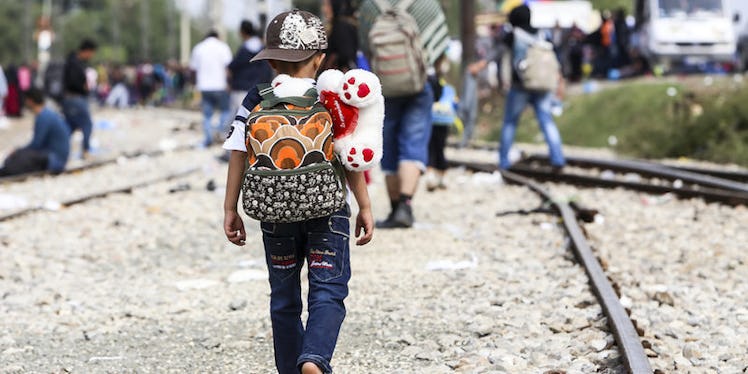
Any Little Bit Helps: 5 Ways to Support Syrian Refugees Around The World
The global refugee crisis has been described by the EU as the worst refugee crisis since World War II. The UN Refugee Agency reported in its annual "Global Trends Report: World At War" that 59.5 million people had been forcibly displaced at the end of 2014. This represents a 13.9 million person increase from the prior year, and half of those were children.
As the refugees brave danger and violence in order to escape persecution and poverty, we can all do our part in showing our support. It doesn't have to be hard. Here are the ways in which we can help:
1. Educate yourself first.
Let’s be honest: You’re not going to understand the global refugee crisis by binge-reading a bunch of 144-character tweets or by skimming the headlines of a couple of news articles. This is a multifaceted, complicated and global problem.
So, to begin to comprehend the refugee crisis, you’re going to need to take the time to educate yourself on the topic. Find out how much you know about the issue.
What is the global refugee crisis? What areas of the world are being affected? Where are the refugees coming from?
What are people saying about it? Find answers to the questions you don't know, and get a better overview of the issue in order to become a well-informed global citizen.
A great option for staying up to date is to sign up for The UN Refugee Agency newsletter. After all, supporting a cause becomes that much more important when you actually know what it is that you're supporting.
2. Donate (and not just your money).
We get it: Not everyone has a significant amount of extra money lying around to donate. But remember: You can give much more than cash to the global refugee crisis. Your clothes, shoes, coats, school supplies, toiletries, furniture and even your old car can be donated.
Able to give funds? Organizations like The UN Refugee Agency,Hope for Syria, Save the Children, Aylan Kurdi and Syria’s Child Victims of War (an organization that supports Hand in Hand For Syria), Unicef, the American Refugee Committee and the Refugee Council work to provide refugees with food, education, shelter, emergency aid, health care, clothing, blankets and many more necessary items and services.
Setting up a crowdfunding page on Go Fund Me or Kickstarter and encouraging your friends and family to spare a couple of dollars is another creative way to be able to donate.
3. Volunteer your time.
Don't have money or supplies to give? Start raising awareness about the crisis in other unique ways. The United Nations World Refugee Day — a day that honors the more than 50 million refugees who are forced to bravely flee their homelands — is held each year on June 20.
Volunteer your time to run events, or put on a public forum in your school auditorium, church or local community center to get conversation flowing. Explain the various ways in which your peers can donate.
If you were planning on drafting a letter to your state legislation, this would be the perfect time to go around and get signatures on a petition. You can also find other opportunities to impact refugees on a more local level — such as tutoring children or volunteering at daycares — by contacting a local refugee resettlement office.
Want to serve in the actual countries affected most by the refugee crisis? Look into becoming a UN Volunteer.
4. Support grassroots efforts.
Supporting grassroots efforts is one of the best ways to truly make a difference in a crisis area on the ground floor. Organizations like the Global Fund for Women give funds to groups helping women and children refugees in Lebanon, Iraq and Jordan. They work to "create safe spaces, meet pressing needs, change laws and policies and teach women their rights so they can become active in shifting power dynamics, both now and in the future."
According to the website, it is vital that the funds be given to grassroots groups because they "prove to be one of the most effective uses of financial resources." They "deliver support to the people who know how to solve problems at the community level."
5. Let your voice be heard.
Whether it's the controversy over people dumping buckets of ice water all over themselves instead of donating to ALS as part of the ice bucket challenge, or the drama over Demi Lovato calling out Taylor Swift for donating money to Kesha instead of publicly showing her support on Twitter, the question of whether the hashtag is worth more than the dollar has been heavily debated over the past couple of years.
If you don't have time, money or supplies to donate, but you are still looking for an outlet to share your support, don't be afraid to turn to social media. As long as you're educated on the issues and prepared to engage in conversations with a follower who may have something to add, your Facebook, Twitter and even Instagram can be great platforms upon which to educate your friends and followers about the ongoing crisis.
Share organizations (or your crowdfunding page). In this way, they can donate or spread the word about upcoming events (like World Refugee Day).
We're all busy and money can be tight, but educating yourself on the global refugee crisis and supporting the refugees around the world doesn't have to be hard. Every little bit truly does matter.